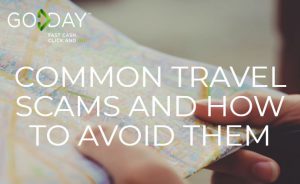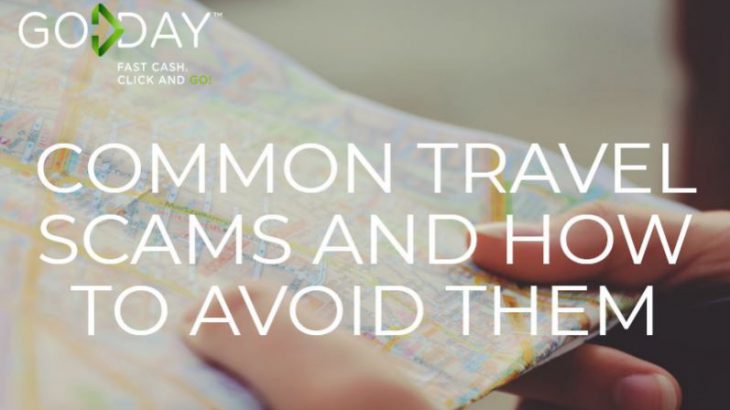
There’s nothing worse than planning for a vacation or travelling only to find out that you’ve fallen victim to a travel scam. These scams or fraudulent attempts can happen while you’re travelling and some you won’t realize until you get home and start to get yourself financially organized. Regardless of how or when they happen, it is always best to be prepared when travelling. You will never know if you are going to fall victim to fraud or a scam while on vacation, but the most you can do is be prepared and have a plan in case things do go wrong. That’s why we created a list of some of the most common travel scams and how to avoid them.
Credit Card Fraud
Using a credit card while travelling is quite common to pay for purchases. But it’s when you encounter credit card fraud while travelling that can become an issue. Before you leave for your trip, make sure to always let your bank know you will be going somewhere as they may see charges from another country and question fraud immediately. Not to mention, everyone has heard of the pickpocket stories of people having their wallets stolen while on vacation. Now that we live in an electronic world, credit card fraud can happen to anyone quicker than you would think, as all it takes is some special software and equipment when people know what they’re doing. That’s why you always want to save any credit card receipts while travelling to ensure that when you’re balancing your budget for when your home, there aren’t any surprises. But what should you do if this happens? Make sure to let your bank know immediately and file a report with the local authorities. From there you should also contact your travel insurance provider as some travel insurance coverage may be able to extend benefits for credit card fraud that can help travellers in an emergency.
Taxi Services
Taxi scams are one of the most popular travel scams out there, no matter what country you are in. The number one rule is if your taxi or ride doesn’t look the same as all of the others you see passing by, don’t hop in, wait for the next one. Whether it is the broken taxi meter, taking you to a far-out place you don’t know and demanding money to return you, meter rigging, longer routes, unlicensed drivers posing as a taxi, or drivers who get a cut when taking you to a particular non-requested shop or restaurant — make sure you do your research about where you’re going so you know how to avoid these types of issues. Your hotel is also a good resource for when it comes to catching a ride as they will be able to help get you where you need to go. Looking for more tips on how to get from point A to point B while travelling? Visit TripSavvy for their tips and tricks on how to avoid taxi scams.
Shopping Deals
Many countries are known for certain items that you may want to purchase while travelling. And some of these items are great to purchase, but you want to make sure you’re not getting hustled or overpaying for them. That’s why before you head off on your next adventure, do your research beforehand in terms of how much things can cost and if there are any go-to spots on where you should buy them from. Because if something seems too good to be true, that means it probably is. This also applies to counterfeit goods. That’s right, the really expensive designer bags and sunglasses are much lower prices than at home because it’s not real. Many vendors may approach you offering a variety of goods or something for “free”. Your best bet on staying safe is to just say no to free gifts from strangers, as they usually turn out to cost quite a bit. But it’s these common travel scams that people now know to avoid, which shouldn’t be confused with negotiating for goods at a set price. In many countries, it’s perfectly normal to negotiate for items at markets to get a deal and usually works out to be beneficial for both the buyer and the seller. Again, it’s about doing your research beforehand to know what the value of items are and so that the seller knows you know your stuff!
Identity theft, types of fraud, counterfeit money and other threats or scams, these are only a few of the many types of travel scams or fraud you can fall victim to. If you do find yourself the victim of a scam, don’t panic. Taking the right steps may help you remedy the situation, or at least prevent you from making things worse. It doesn’t matter where in the world you are, no one likes to feel like they’ve been ripped off. And unfortunately, scammers are out there, but that shouldn’t discourage you from exploring the world and planning your next trip or vacation. There are many ways you can actively protect yourself as a consumer when it comes to fraud but a lot of people don’t know what to do in these situations. It can sometimes become difficult to find a balance between being over prepared and paranoid so much so that you can’t relax and enjoy your trip and being more laid back like you are back home so you can enjoy your travels. To make sure you’re doing your part in protecting your identity online, follow the tips we’ve discussed. You can also visit the Government of Canada website for protection from the many different types of fraud and scams you may have fallen victim to. What are you travel tips for avoiding being scammed? Let us know in the comment section below.



